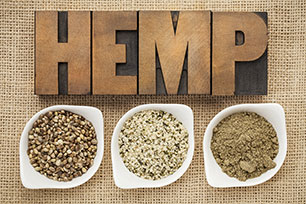
Hemp can heal. Hemp can be used for clothing, bags and accessories. Hemp can become plastic, insulation and building materials. Yet one of the best uses for this amazing plant is for eating. Hemp is a superfood. The seeds of the hemp plant provide outstanding nutritional benefits that far surpass similar grains. People of all ages can safely enjoy eating hemp.
Eaten as seeds, flour, oil or protein supplements, hemp cannot get you "high," but will make you feel healthy. Hemp contains vitamins, minerals, amino acids, essential fatty acids and protein all at optimum levels for human beings.
 Vitamins, Minerals & Protein
Vitamins, Minerals & Protein
Hemp seeds offer high levels of vitamins A, C and E. Eating hemp supplies the body with the natural vitamins folate, iron and calcium. They also contain beta-carotene and are rich in carbohydrates.
Hemp is a complete source of protein. One ounce of hemp seeds (approximately 2 tablespoons) contains 10 grams of protein, making it one of the densest sources of natural plant protein. As a comparison, the same amount of flax seeds contain 5.1 grams of protein and chia seeds only contain 4.7 grams. Hemp also contains all 10 Essential Amino Acids, the building blocks of protein. This makes hemp an outstanding choice for vegans, vegetarians, athletes or anyone looking for a healthy and natural source of protein.
Fiber is important for a healthy digestive system. Eating 3.5 tablespoons of hemp seeds provides the body with 16 grams of fiber. This is nearly half the recommended daily requirement.
Hemp is naturally low in sugar; less than one gram per serving. It is also gluten free and dairy free. Hemp milk has a rich nutty taste and is not overly sweet.
Hemp is also high in magnesium, an important mineral for our muscles and bones. One ounce of hemp seeds provide 179 mg of magnesium (roughly 45% of the daily recommended nutritional amount).
Hemp is a complete source of protein. One ounce of hemp seeds (approximately 2 tablespoons) contains 10 grams of protein, making it one of the densest sources of natural plant protein. As a comparison, the same amount of flax seeds contain 5.1 grams of protein and chia seeds only contain 4.7 grams. Hemp also contains all 10 Essential Amino Acids, the building blocks of protein. This makes hemp an outstanding choice for vegans, vegetarians, athletes or anyone looking for a healthy and natural source of protein.
Fiber is important for a healthy digestive system. Eating 3.5 tablespoons of hemp seeds provides the body with 16 grams of fiber. This is nearly half the recommended daily requirement.
Hemp is naturally low in sugar; less than one gram per serving. It is also gluten free and dairy free. Hemp milk has a rich nutty taste and is not overly sweet.
Hemp is also high in magnesium, an important mineral for our muscles and bones. One ounce of hemp seeds provide 179 mg of magnesium (roughly 45% of the daily recommended nutritional amount).
 Essential Fatty Acids
Essential Fatty Acids
Omega-3 (alpha-linolenic acid) and Omega-6 (linoleic acid) are important for good skin, strong muscles and robust joints. EFAs strengthen the brain, heart, digestive system and reproductive system.
Hemp oil contains Omega-3 and Omega-6 fatty acids in a three-to-one (3:1) ratio that perfectly matches the nutritional needs of the human body. Unlike chia or flax seeds, hemp contains GLA (gamma-linolenic acid) which is known to reduce inflammation.
 Hemp seeds can be added to smoothies, cereal or yogurt.
Hemp seeds can be added to smoothies, cereal or yogurt.Hemp flour can be used in any of your favorite recipes.
Hemp oil adds a rich flavor to cooking and baked goods.
Hemp milk is nutty and not-too-sweet.




